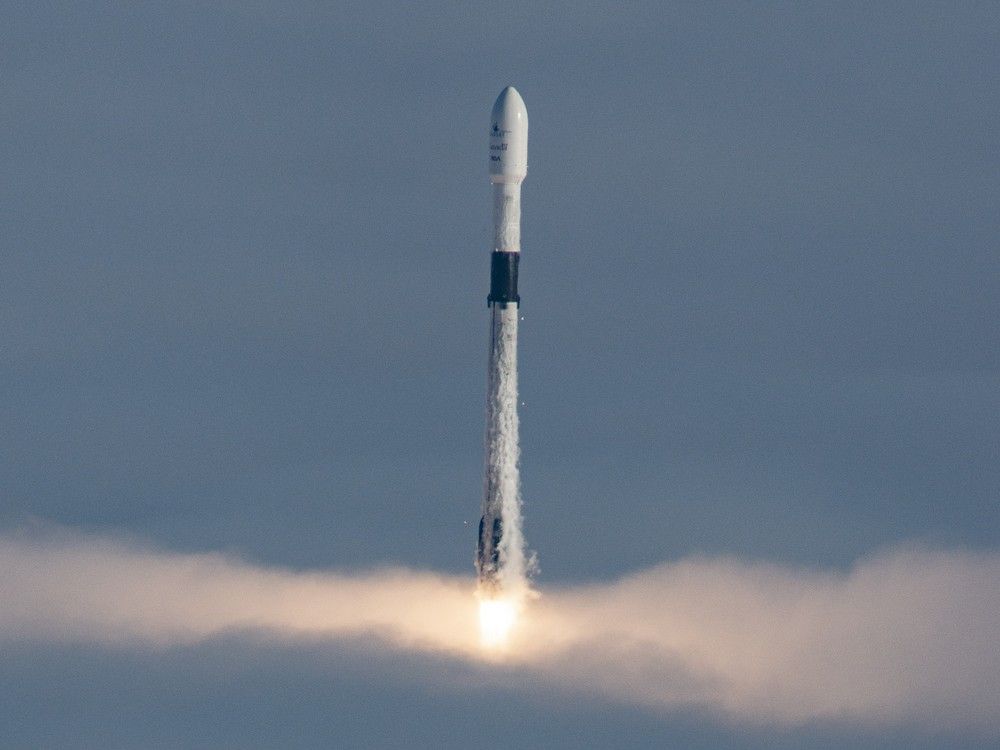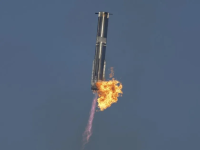New rocket site could reduce Canada’s dependence on U.S. launches
Canada is one of the only space-faring nations without a sovereign launch capability
Author of the article avid Pugliese • Ottawa Citizen
avid Pugliese • Ottawa Citizen
Published Jan 10, 2025 • Last updated 1 day ago • 3 minute read
The Department of National Defence says that a new commercial rocket launch facility being built in Nova Scotia will help reduce Canada's reliance on other countries for launching its own spacecraft.
The Department of National Defence says that a new commercial rocket launch facility being built in Nova Scotia will help reduce Canada's reliance on other countries for launching its own spacecraft.
A rocket launch facility being developed on the east coast could provide valuable services to the U.S. as well as score Canada points in convincing Americans it is doing its part on the security front, according to federal government officials.
An internal Department of National Defence briefing on Maritime Launch Services also pointed out that the new capability will help reduce Canada’s reliance on other countries for launching its own spacecraft.
Maritime Launch Services, a Canadian firm founded in 2016 and headquartered in Nova Scotia, is building the country’s first spaceport. The company completed its first suborbital launch on July 7, 2023 and is planning its first orbital launch in 2026 from its location near Canso, N.S.
The DND memorandum, prepared in January 2024, noted that Canada is one of the only space-faring nations without a sovereign launch capability. It has relied on other countries including, in the past, Russia to launch spacecraft.
The Maritime Launch Services project could be a definite asset for Canada, noted the document prepared for Defence Minister Bill Blair by then deputy minister Bill Matthews.
Such a capability would reduce Canada’s dependency on other nations, give it the flexibility to launch its own satellites when needed, and possibly reduce launch costs.
“It would also contribute to the broader defence and security goals across North America, and would further raise Canada’s standing in the eyes of allies, in particular the US, who has been critical of Canada’s insufficient investments in defence,” noted the document, obtained by the Ottawa Citizen using the Access to Information Act. “Canada adding a launch capability on the east coast of North America will allow access to a range of key orbits of interest to the U.S. and would add to Canada’s relevance and credibility in the international space community by also offering additional launch options to other allies and partners.”
But despite the highly positive briefing, the DND and Canadian Forces are non-committal to the Maritime Launch Services (MLS) initiative.
“The Department of National Defence and the Canadian Armed Forces has not provided any funding for Maritime Launch nor has it committed to using its capabilities in the future,” DND spokeswoman Andrée-Anne Poulin said in an email.
No further comment or information was provided.
Maritime Launch Services did not respond to a request for comment.
The company announced in September that is working with another firm to install a new ground station at its spaceport. That is expected to be operational sometime this year.
The Canadian government provided a $120,000 repayable contribution to Maritime Launch Services to prepare for the installation of specialized tracking and communications equipment at its spaceport.
Access to space is becoming more difficult because of a lack of launch facilities, according to various studies.
A 2023 study by Deloitte consultants noted the space launch infrastructure in the U.S. is running out of capacity as public and private sector demand for access to space is accelerating faster than ever before.
The Wall Street Journal reported on Jan. 5 that U.S. government officials and industry executives fear that backed-up launch sites would restrict payloads from getting to space in a timely manner. In 2024, there were 145 orbital launches from the U.S., five times as many as in 2017, the newspaper noted. SpaceX, a commercial firm headed by Elon Musk, conducted 134 of the launches in 2024.
China has also expanded its launch capabilities, opening up the first commercial facility last year to supplement government-run spaceports. It conducted its first launch in December, according to Chinese state media.
Some in the Canadian military and government have long advocated for the country to develop its own launch capabilities, in particular a rocket system.
In 2011, the Ottawa Citizen reported that government officials argued Canada has the technological ability to build its own rocket to launch small satellites.
In addition, a 2009 briefing package produced by the military’s Chief of Force Development noted that the development of a launcher for small satellites is a key focus area for DND’s future research and development.
But little progress has been made and Canada continues to rely on allies and foreign companies for rockets and launch capabilities.

 torontosun.com
torontosun.com
Canada is one of the only space-faring nations without a sovereign launch capability
Author of the article
Published Jan 10, 2025 • Last updated 1 day ago • 3 minute read
The Department of National Defence says that a new commercial rocket launch facility being built in Nova Scotia will help reduce Canada's reliance on other countries for launching its own spacecraft.
The Department of National Defence says that a new commercial rocket launch facility being built in Nova Scotia will help reduce Canada's reliance on other countries for launching its own spacecraft.
A rocket launch facility being developed on the east coast could provide valuable services to the U.S. as well as score Canada points in convincing Americans it is doing its part on the security front, according to federal government officials.
An internal Department of National Defence briefing on Maritime Launch Services also pointed out that the new capability will help reduce Canada’s reliance on other countries for launching its own spacecraft.
Maritime Launch Services, a Canadian firm founded in 2016 and headquartered in Nova Scotia, is building the country’s first spaceport. The company completed its first suborbital launch on July 7, 2023 and is planning its first orbital launch in 2026 from its location near Canso, N.S.
The DND memorandum, prepared in January 2024, noted that Canada is one of the only space-faring nations without a sovereign launch capability. It has relied on other countries including, in the past, Russia to launch spacecraft.
The Maritime Launch Services project could be a definite asset for Canada, noted the document prepared for Defence Minister Bill Blair by then deputy minister Bill Matthews.
Such a capability would reduce Canada’s dependency on other nations, give it the flexibility to launch its own satellites when needed, and possibly reduce launch costs.
“It would also contribute to the broader defence and security goals across North America, and would further raise Canada’s standing in the eyes of allies, in particular the US, who has been critical of Canada’s insufficient investments in defence,” noted the document, obtained by the Ottawa Citizen using the Access to Information Act. “Canada adding a launch capability on the east coast of North America will allow access to a range of key orbits of interest to the U.S. and would add to Canada’s relevance and credibility in the international space community by also offering additional launch options to other allies and partners.”
But despite the highly positive briefing, the DND and Canadian Forces are non-committal to the Maritime Launch Services (MLS) initiative.
“The Department of National Defence and the Canadian Armed Forces has not provided any funding for Maritime Launch nor has it committed to using its capabilities in the future,” DND spokeswoman Andrée-Anne Poulin said in an email.
No further comment or information was provided.
Maritime Launch Services did not respond to a request for comment.
The company announced in September that is working with another firm to install a new ground station at its spaceport. That is expected to be operational sometime this year.
The Canadian government provided a $120,000 repayable contribution to Maritime Launch Services to prepare for the installation of specialized tracking and communications equipment at its spaceport.
Access to space is becoming more difficult because of a lack of launch facilities, according to various studies.
A 2023 study by Deloitte consultants noted the space launch infrastructure in the U.S. is running out of capacity as public and private sector demand for access to space is accelerating faster than ever before.
The Wall Street Journal reported on Jan. 5 that U.S. government officials and industry executives fear that backed-up launch sites would restrict payloads from getting to space in a timely manner. In 2024, there were 145 orbital launches from the U.S., five times as many as in 2017, the newspaper noted. SpaceX, a commercial firm headed by Elon Musk, conducted 134 of the launches in 2024.
China has also expanded its launch capabilities, opening up the first commercial facility last year to supplement government-run spaceports. It conducted its first launch in December, according to Chinese state media.
Some in the Canadian military and government have long advocated for the country to develop its own launch capabilities, in particular a rocket system.
In 2011, the Ottawa Citizen reported that government officials argued Canada has the technological ability to build its own rocket to launch small satellites.
In addition, a 2009 briefing package produced by the military’s Chief of Force Development noted that the development of a launcher for small satellites is a key focus area for DND’s future research and development.
But little progress has been made and Canada continues to rely on allies and foreign companies for rockets and launch capabilities.

New rocket site could reduce Canada’s dependence on U.S. launches
Canada is one of the only space-faring nations without a sovereign rocket launch capability.




![blue-origin-new-rocket[1].jpg blue-origin-new-rocket[1].jpg](https://forums.canadiancontent.net/data/attachments/25/25124-1a28310c2e3c417b5374697b6d562758.jpg)










![Gjaa-xNW4AERR4n[1].jpg Gjaa-xNW4AERR4n[1].jpg](https://forums.canadiancontent.net/data/attachments/25/25755-e634643fd645d90781b159a04bfd886b.jpg)









